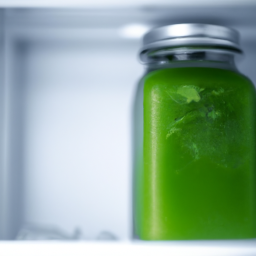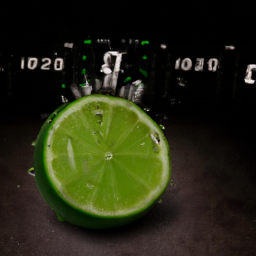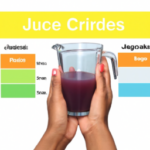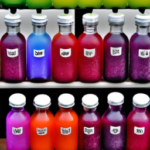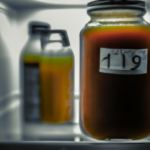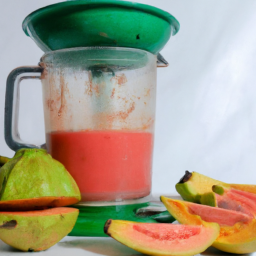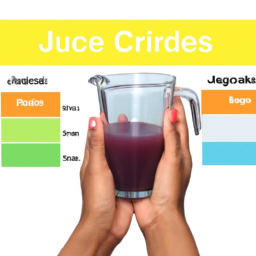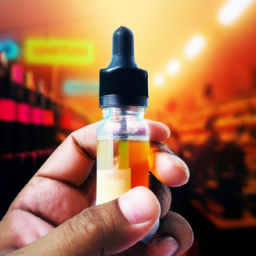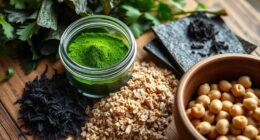I know you might be hesitant to purchase pressed juice because you’re worried it will spoil before you can finish it. But fear not, fellow juice lover, I have thoroughly researched the matter and am prepared to share all the details about how long pressed juice can last in your fridge.
Pressed juice is a popular choice for those looking to incorporate more fruits and vegetables into their diet in a convenient and delicious way. However, unlike store-bought juice with added preservatives, pressed juice has a shorter shelf life. It’s important to know how long your juice will last in the fridge to ensure you’re getting the most out of your purchase and avoid any potential health risks.
So, let’s dive into the science behind pressed juice shelf life and how we can prolong it.
Key Takeaways
- Proper storage is essential to maintain the quality and freshness of pressed juice, and it should be stored in an airtight container in the fridge at a temperature between 32-40°F.
- Adding a few drops of lemon juice to pressed juice can act as a natural preservative and help to slow down the growth of bacteria.
- Fresh pressed juice can last up to 3-5 days in the fridge with proper storage, while unpasteurized juice has a shorter shelf life than pasteurized juice because it contains more bacteria.
- Signs of spoiled pressed juice include a sour smell, moldy appearance, cloudy texture, separation, and bitter taste, and consuming contaminated juice can lead to serious health issues.
Understanding Pressed Juice Shelf Life
So, how long can you expect your pressed juice to last in the fridge? Let’s dive in and find out!
The answer to this question depends on a few factors, such as the type of juice, the method of extraction, and the storage conditions. However, there are ways to extend the shelf life of your pressed juice and reap the benefits of fresh pressed juice for a longer period.
One way to extend the shelf life of your pressed juice is by storing it in an airtight container in the fridge. This will prevent the juice from coming into contact with oxygen, which can cause oxidation and spoilage.
Another way is to add a few drops of lemon juice to your pressed juice. The citric acid in lemon juice can act as a natural preservative and help to slow down the growth of bacteria.
By following these tips, you can enjoy your fresh pressed juice for up to 3-5 days in the fridge.
Now, let’s take a look at the average shelf life of pressed juice.
The Average Shelf Life of Pressed Juice
I want to discuss the average shelf life of pressed juice and answer two crucial questions: how long can pressed juice last in the fridge and how long can it last outside the fridge?
The shelf life of pressed juice depends on several factors, including the type of juice, the method of extraction, and the storage conditions. Proper storage is essential to maintain the quality and freshness of the juice.
To keep pressed juice fresh, it should be stored in a sealed container in the fridge and consumed within three to five days. If left outside the fridge, the juice can spoil quickly due to bacterial growth and should be consumed within a few hours. It’s important to note that unpasteurized juice has a shorter shelf life than pasteurized juice because it contains more bacteria.
In summary, the shelf life of pressed juice varies depending on the factors mentioned above, but proper storage is key to extending its freshness.
How Long Can Pressed Juice Last in the Fridge?
You’ll want to consume pressed juice within 3-4 days of refrigerating it, as the nutrients and flavors can quickly degrade over time. To ensure the best storage and prevent spoilage, it’s important to keep the juice in an airtight container and place it in the coldest part of your fridge.
This will help slow down the oxidation process and keep the juice fresher for longer. It’s also a good idea to shake the container before consuming the juice, as this can help prevent separation and ensure that all the nutrients are evenly distributed.
Remember that pressed juice doesn’t have any preservatives, so it’s important to consume it as soon as possible to get the most nutrients out of it.
Now, let’s explore how long pressed juice can last outside the fridge.
How Long Can Pressed Juice Last Outside the Fridge?
If you leave pressed juice outside the fridge, it will quickly lose its nutrients and flavors and spoil within a few hours. Storing fresh juice at room temperature is not recommended as it is prone to bacterial growth, oxidation, and fermentation, which can lead to spoilage and contamination. Fresh juice is best consumed immediately after it is pressed, but if you need to store it for a short period of time, refrigeration is crucial to maintaining its quality and freshness.
To illustrate the point further, below is a table that shows the estimated shelf life of pressed juice under different storage conditions:
| Storage Temperature | Shelf Life |
|---|---|
| Room Temperature | 2-4 hours |
| Refrigerator | 24-48 hours |
| Freezer | 3-6 months |
Drinking fresh juice has numerous benefits for our health, such as boosting our immunity, improving digestion, and providing essential nutrients and antioxidants. Therefore, it is essential to store it properly to preserve its nutritional value and taste. In the next section, we will discuss the factors that affect pressed juice’s shelf life and how to extend its freshness.
Factors That Affect Pressed Juice Shelf Life
Did you know that factors such as temperature, air exposure, and the type of produce used can all affect how long your pressed juice will last in the fridge? Here are some specific factors that can impact the shelf life of your juice:
-
Temperature: Pressed juice should always be stored in the fridge at a temperature between 32-40°F to prevent harmful bacteria growth.
-
Air exposure: Exposure to air can cause oxidation, which can lead to a shorter shelf life. Make sure to store your juice in an airtight container or bottle.
-
Type of produce: Some fruits and vegetables oxidize faster than others. For example, lemon juice and ginger tend to have a longer shelf life than leafy greens.
-
Pasteurization: Pasteurized juice has a longer shelf life than unpasteurized juice because it has been heated to kill bacteria.
Understanding these factors can help you properly store your pressed juice and prolong its shelf life. However, there are also other tips you can follow to prevent spoilage and extend the life of your juice.
Tips to Prolong Pressed Juice Shelf Life
Now that we know the factors that affect the shelf life of pressed juice, let’s talk about some practical tips to prolong its freshness.
One of the best ways to store pressed juice is to keep it in an airtight container, such as a glass bottle or a mason jar, in the refrigerator. This will help prevent air and moisture from getting in and causing the juice to spoil.
It’s also important to keep the juice away from light and heat, as these can accelerate the oxidation process and lead to spoilage.
Another way to make the most out of your pressed juice is to reuse the pulp. Instead of throwing it away, you can add it to smoothies, oatmeal, soups, and other recipes to boost their nutritional value.
You can also use the pulp to make homemade crackers, veggie burgers, and even dog treats. By doing so, you’ll not only reduce food waste but also save money and enhance the flavor and texture of your meals.
Speaking of freshness, it’s crucial to know when pressed juice has gone bad and should be discarded. In the next section, we’ll explore some telltale signs of spoiled juice and how to avoid consuming it.
Signs of Spoiled Pressed Juice
To ensure that you don’t end up drinking spoiled pressed juice, it’s important to keep an eye out for telltale signs such as a sour smell or a moldy appearance. Common contaminants found in spoiled pressed juice include bacteria, yeast, and mold. These contaminants can cause serious health risks if consumed, including food poisoning and infections. It’s crucial to always check for signs of spoilage before consuming pressed juice, especially if it has been stored in the fridge for an extended period of time.
To help you identify the signs of spoiled pressed juice more easily, here’s a table outlining the most common indicators:
| Signs of Spoiled Pressed Juice | Description |
|---|---|
| Sour smell | The juice has a sour or unpleasant odor. |
| Moldy appearance | The juice appears to have mold growing on it. |
| Cloudy texture | The juice looks cloudy or murky. |
| Separation | The juice has separated into distinct layers. |
| Bitter taste | The juice tastes bitter or off. |
If you notice any of these signs, it’s best to discard the juice immediately to avoid any potential health risks. In the next section, we’ll discuss the risks of drinking spoiled pressed juice in more detail.
Risks of Drinking Spoiled Pressed Juice
It’s important for you to understand the potential risks of drinking spoiled pressed juice, as consuming contaminated juice can lead to serious health issues, such as food poisoning and infections. Common contaminants found in spoiled juice include bacteria, mold, and yeast. These contaminants thrive in conditions where the juice is not properly stored or handled, such as leaving the juice out at room temperature for too long.
Consuming contaminated juice can lead to a range of health risks, from mild stomach discomfort to more severe illnesses. Symptoms of food poisoning from spoiled juice can include nausea, vomiting, diarrhea, and abdominal cramps. Infections from contaminated juice can also cause fever, chills, and body aches.
Don’t put yourself at risk, always make sure to properly store your pressed juice and discard any juice that has been left out for too long.
As we move on to discussing preservatives and additives in pressed juice, it’s important to note that preventing spoilage is crucial in ensuring the safety of your juice.
Preservatives and Additives in Pressed Juice
As someone who’s concerned about the quality and safety of the foods I consume, I’m interested in learning more about the preservatives and additives often found in pressed juice.
There are two main types of preservatives: natural and artificial. While natural preservatives are generally considered safe, artificial preservatives have been linked to health issues and may be best avoided.
Additionally, some pressed juices may contain additives to enhance flavor or texture, so it’s important to read labels and understand what you’re putting in your body.
Natural Preservatives
Did you know that there are natural preservatives like lemon juice and honey that can help extend the life of your pressed juice in the fridge? Fruit enzymes in pressed juice can cause the juice to spoil quickly, but adding natural preservatives can help slow down the process.
Lemon juice is a natural preservative that’s high in citric acid, which can help prevent the growth of bacteria and mold. Adding a small amount of lemon juice to your pressed juice can help it last longer in the fridge.
Honey is another natural preservative that can help extend the life of your pressed juice. Honey has been used for centuries as a natural preservative due to its antibacterial properties. Honey also contains natural enzymes that can help with natural fermentation, which can help preserve the juice. Adding a small amount of honey to your pressed juice can not only help it last longer, but it can also add a touch of natural sweetness.
However, if you prefer to avoid natural preservatives altogether, the next section will discuss the use of artificial preservatives in pressed juice.
Artificial Preservatives
You may be surprised to know that many pressed juices contain artificial preservatives, with some studies finding that up to 80% of commercial juices contain them. These preservatives are added to extend the shelf-life of the juice and prevent bacterial growth. Some of the most commonly used artificial preservatives in juices are sodium benzoate, potassium sorbate, and ascorbic acid.
However, there are alternatives to these artificial preservatives that are more natural and healthier. For example, some companies use high-pressure processing (HPP) to preserve their juices. HPP is a non-thermal pasteurization process that uses pressure to inactivate microorganisms and enzymes. Other companies use citric acid or vinegar as natural preservatives.
It’s important to be aware of the potential health consequences of consuming artificial preservatives, as some studies have linked them to health issues such as allergies, asthma, and even cancer. Therefore, it’s always a good idea to read the label and choose juices that contain natural preservatives.
Moving onto the next section, it’s important to note that some juices contain additives in addition to preservatives.
Additives
While artificial preservatives can prolong the shelf life of pressed juice, they’re not always the best option for maintaining freshness. That’s where additives come in.
Additives are substances added to food to enhance flavor, texture, and appearance, and to preserve freshness. There are different types of additives that can be used in pressed juice, such as ascorbic acid (vitamin C) and citric acid, which help preserve the color and flavor of the juice.
However, while additives can help keep pressed juice fresh for longer, they can also have negative effects on health. Some additives have been linked to allergic reactions, asthma, and even cancer. It’s important to understand the types of additives used in pressed juice and their potential effects on health before consuming them.
While some additives are generally recognized as safe by the FDA, it’s still important to consume them in moderation and to opt for fresh, whole foods whenever possible.
When it comes to comparing DIY pressed juice and store-bought pressed juice, there are a few key differences to consider.
DIY Pressed Juice vs. Store-Bought Pressed Juice
If you’re deciding between making your own pressed juice or buying it from a store, keep in mind that homemade juice can be customized to your preferences and may have a shorter shelf life than store-bought options. Homemade juice is typically made with fresh ingredients and doesn’t contain any additives or preservatives, which can affect its nutritional value and lifespan.
On the other hand, store-bought pressed juice is often pasteurized, which extends its shelf life but can also reduce its nutritional value. When comparing the nutritional value of homemade vs. store-bought pressed juice, it’s important to consider the quality of the ingredients and the processing methods used.
Homemade juice can be made with locally sourced, organic produce that retains its maximum nutritional value, while store-bought juice may contain lower quality ingredients and be processed using high heat or pressure, which can damage the nutrients. Ultimately, the decision to make your own juice or buy it from a store depends on your personal preferences and lifestyle.
Speaking of lifestyle, one way to reduce waste and recycle pressed juice containers is to repurpose them for other uses, such as storing snacks or organizing small items. By finding creative ways to reuse these containers, we can help reduce our impact on the environment.
Recycling Pressed Juice Containers
Now that we know the benefits of making our own pressed juice, let’s talk about what we can do with the containers they come in. As someone who’s conscious about the environment, I always try to find ways to repurpose or recycle the containers instead of throwing them away.
Here are some ideas on how to do just that:
-
Use them as planters: Clean out the container and use it to start your own herb garden or small plant. The container’s size makes it perfect for smaller plants and can be a fun DIY project.
-
Storage for small items: The container’s airtight seal makes it great for storing small items like nuts, bolts, or crafting supplies.
-
Donate them: Some organizations may accept clean containers for their own use. Check with local schools, community centers, or shelters to see if they could use them.
-
Eco-friendly disposal options: If you can’t find a way to repurpose the container, make sure to dispose of it properly. Look for recycling options in your area or consider composting the container if it’s made of biodegradable materials.
By finding ways to repurpose or recycle pressed juice containers, we can help reduce waste and minimize our impact on the environment. So next time you finish a container of pressed juice, think twice before throwing it away and consider these eco-friendly options.
Frequently Asked Questions
Can I freeze pressed juice to prolong its shelf life?
Yes, freezing pressed juice is a great way to prolong its shelf life and retain its nutrients. The benefits of freezing include preserving the juice’s taste and texture. Use airtight containers or freezer bags and consider different freezing techniques for optimal results.
How often should I consume pressed juice to avoid it spoiling?
To avoid pressed juice from spoiling, I consume it regularly. It offers numerous benefits, like increased nutrient intake and improved digestion. To tell if juice has gone bad, check for off smells, mold, or a sour taste.
Can I mix different types of pressed juice together and store them in the fridge?
Mixing different types of pressed juices is a fun way to experiment with taste combinations. However, it’s important to ensure freshness by consuming within 24-48 hours and keeping stored in the fridge.
Is it safe to consume pressed juice after the expiration date has passed?
Food safety is a top priority when it comes to consuming pressed juice. It’s not recommended to consume it after the expiration date has passed. Always check for spoilage indicators such as bad odor, unusual color or taste.
What is the best way to store pressed juice to maximize its shelf life?
To maximize the shelf life of pressed juice, I use proper storing techniques and preservation methods. I recommend using airtight containers, storing in the coldest part of the fridge, and consuming within 3-5 days to ensure freshness and safety.
Conclusion
So, there you have it – the answer to the question ‘how long does pressed juice last in the fridge?’
The average shelf life of pressed juice is around 72 hours, although this can vary depending on a number of factors. It’s important to take care when storing your pressed juice and to look out for signs of spoilage, as drinking spoiled juice can lead to a number of health risks.
One example of the importance of proper storage is my friend Sarah, who bought some fresh pressed juice from a local store and left it in her fridge for a week. When she finally went to drink it, she noticed that it had a strange smell and taste. Being curious, she decided to drink it anyway – only to find that she ended up with a stomach ache and diarrhea.
This just goes to show that taking care with your pressed juice can make all the difference!
Ilana has been a vegan for over 10 years. She originally made the switch for health reasons, but soon found herself becoming more and more passionate about the ethical and environmental implications of a vegan lifestyle. Ilana is the author of The Graceful Kitchen, a blog all about veganism. She loves to cook up delicious and nutritious vegan meals, and share her recipes with others who are interested in leading a cruelty-free life. Ilana is also a strong advocate for using whole foods as the foundation of a healthy diet, and believes that going vegan is one of the best ways to achieve this.
